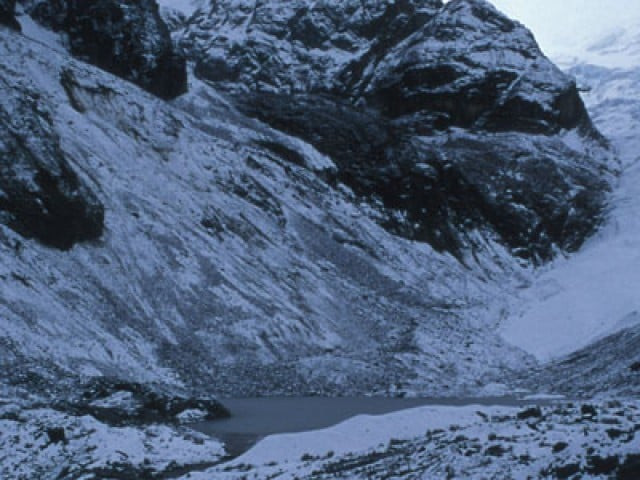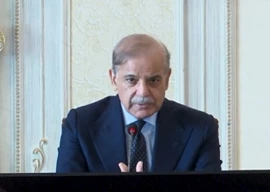
Submitting a written reply in the National Assembly on Thursday during the question hour, Climate Change Minister Zahid Hamid said there were a number of studies on glaciers in Pakistan, but they offered conflicting analysis of the situation.
36 glacial lakes in G-B unsafe: weatherman
Quoting some of the studies, Hamid said that there were around 15,000 glaciers in the three major mountain ranges of the Himalaya, Karakoram and the Hindu Kush, but only a few had been studied.
Hamid said that the International Centre for Integrated Mountain Development (ICMOD) had described 2,420 glacial lakes in Pakistan which had now increased to 3,044, as reported by Pakistan Meteorological Department (PMD) recently.
Meanwhile, he said that a 2011 study by Dick Scherler showed that out of 42 glaciers studied in the Karakoram region, 58 per cent were stable while only 42 per cent showed signs of retreating. This is in contrast to a worldwide decline for mountain glaciers.
On the other hand, a 2010 report by Inman based on reviews conducted in 2006 by Cogley and others, the Himalayan glaciers were losing mass faster than European glaciers, but slower than those in Alaska.
Pakistan's climate change 'time bomb' is already ticking
Climate change projections developed by Pakistan Global Change Impact Studies Centre (GCISC) indicate that the rate of change in the northern areas of Pakistan was higher when compared to the changes in southern Pakistan.
The high rate of increase in temperature and formation of glacial lakes in the vicinity of glaciers, he said, were further proof of glaciers melting.
However, Hamid assuaged fears of parliamentarians, claiming that they were working on the issue. He said that the government had collaborated with the United Nations Development Programme (UNDP) on a glacial lake outburst flood (GLOF) project to avert risks associated with Glofs in the northern areas such as Chitral and Gilgit which had suffered during this year’s floods.
The project, according to Hamid, is likely to be completed by the end of 2015.
Climate change lessons take to the stage in Badin
The minister underscored the need for concerted efforts to overcome difficulties that hinder the true assessment of glacier mass balance in the region.
He was of the opinion that the number of meteorological observations need to increase. For this purpose, the Pakistan Meteorological Department, in collaboration with International Centre for Integrated Mountain Development, was trying to expand its information network in the region.
The UN’s weather agency said this week that 2015 is likely to be the hottest year on record.
“2015 is likely to be the hottest year on record, with ocean surface temperatures at the highest level since measurements began,” said Michel Jarraud, head of the World Meteorological Organisation.
Glacial floods: Coordinated regional policy stressed
The WMO said data from the first 10 months of the year suggested that the global average surface temperature had reached “the symbolic and significant milestone” of 1.0 degree Celsius above mid-19th century levels. Global surface temperatures this year are also about 0.73 degrees Celsius above the 1961-1990 average of 14 degrees Celsius, WMO said.
Hundreds of Railways posts vacant
On another question, Minister of Railways Saad Rafique informed the house that currently there were 11,845 vacant posts in Pakistan Railways.
He added that they had set aside a 20 per cent quota for appointment of children of railway employees.
To ensure transparency in the recruitment process, Rafiq said Pakistan Railways is conducting a written examination of the candidates through the National Testing Service.
Published in The Express Tribune, November 27th, 2015.


















COMMENTS
Comments are moderated and generally will be posted if they are on-topic and not abusive.
For more information, please see our Comments FAQ